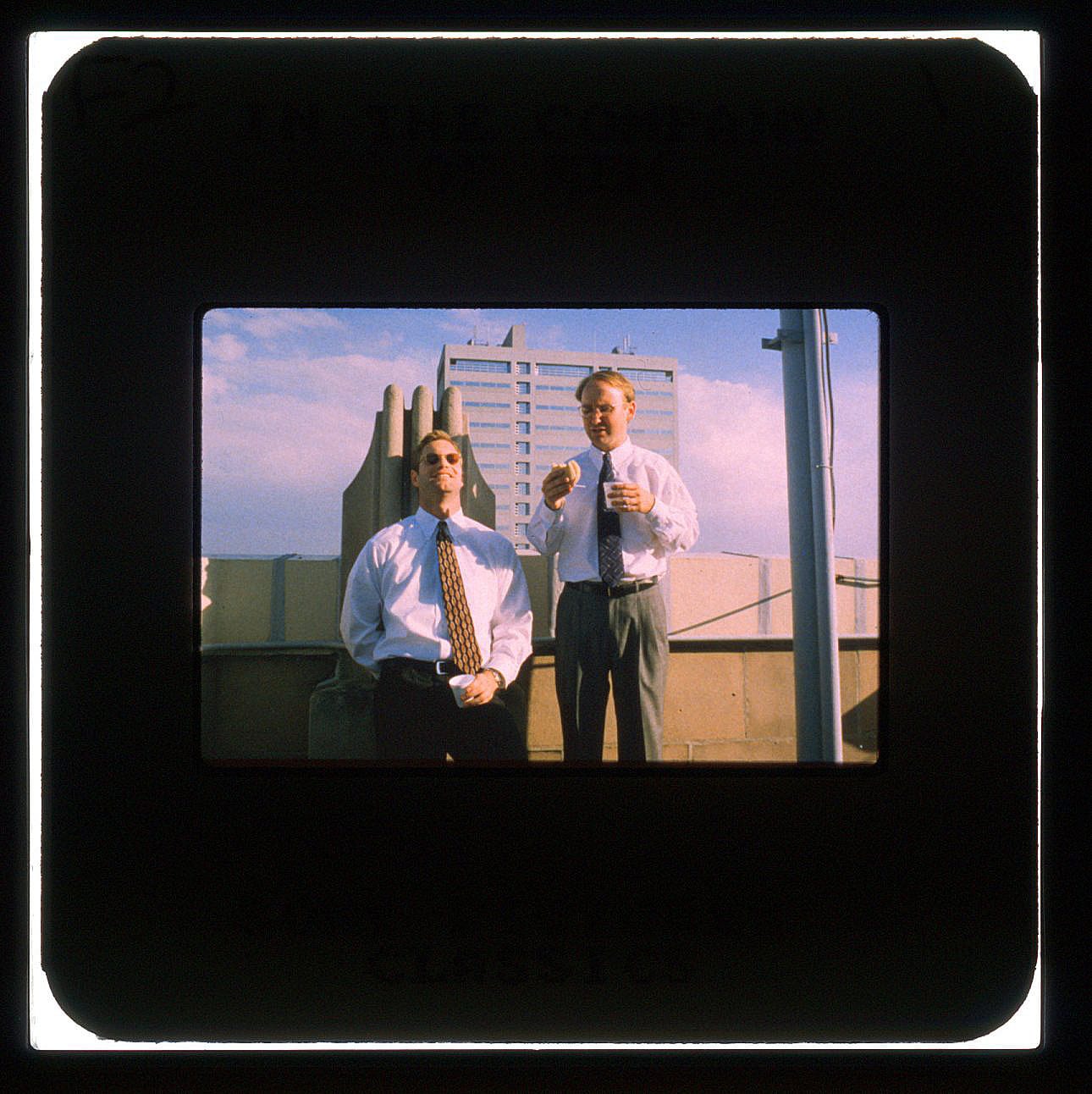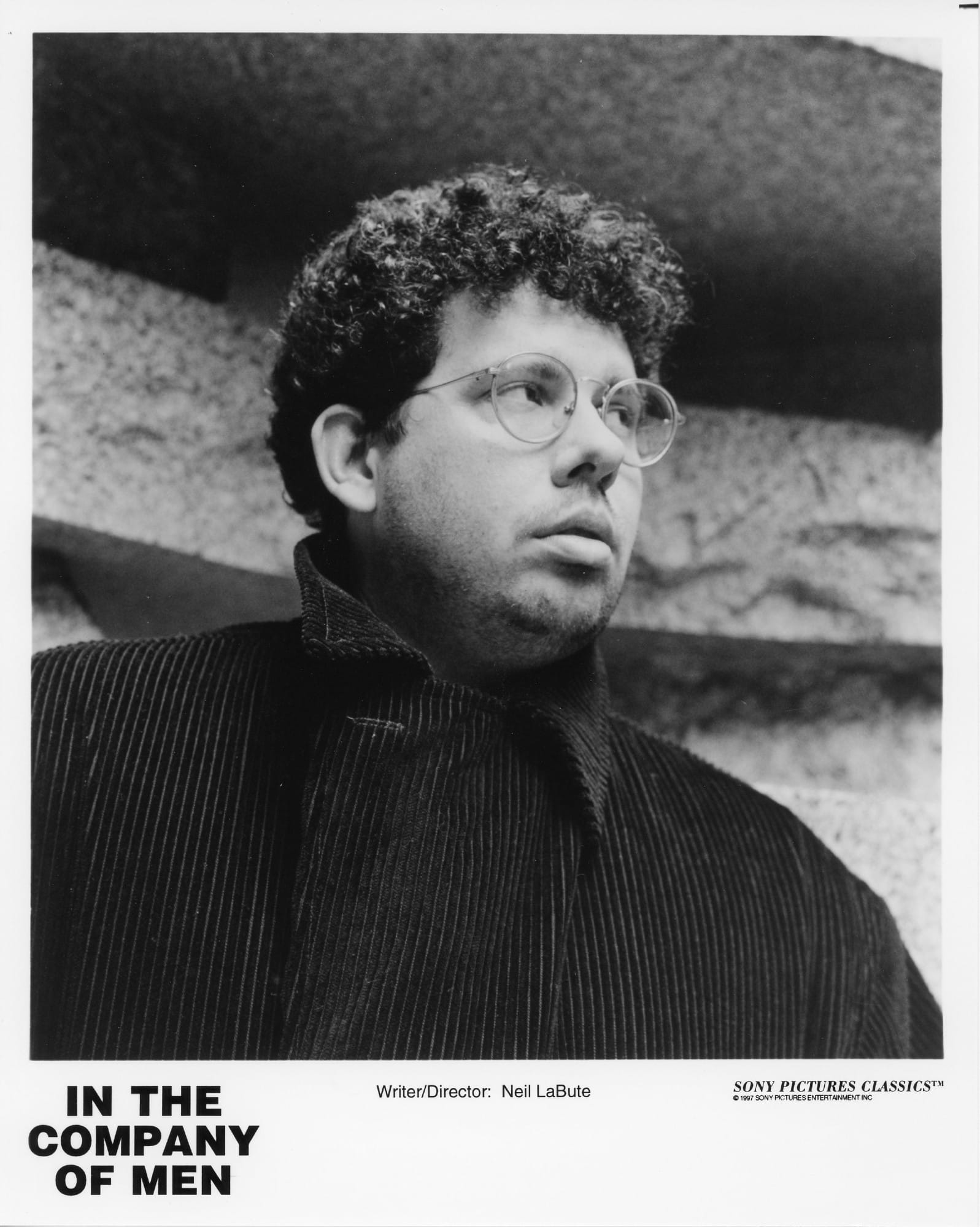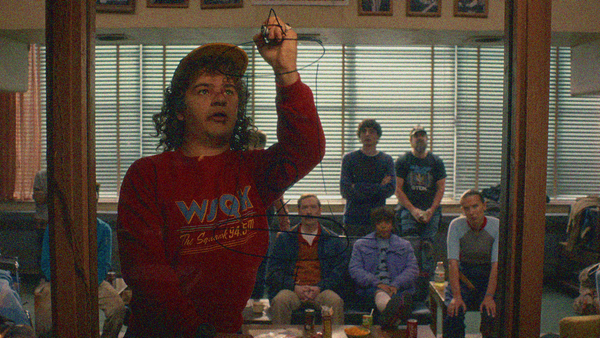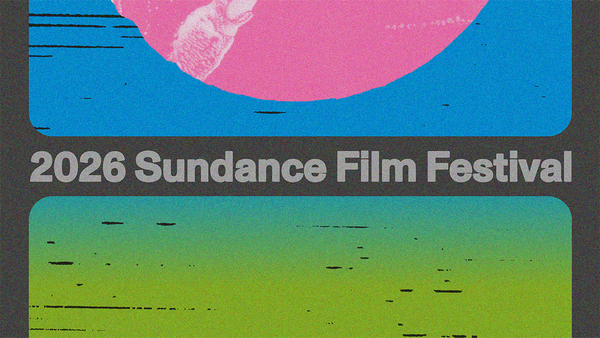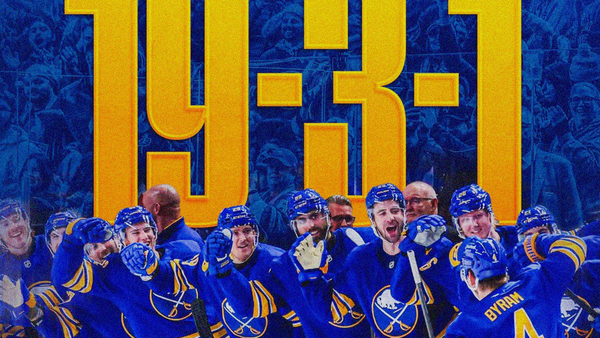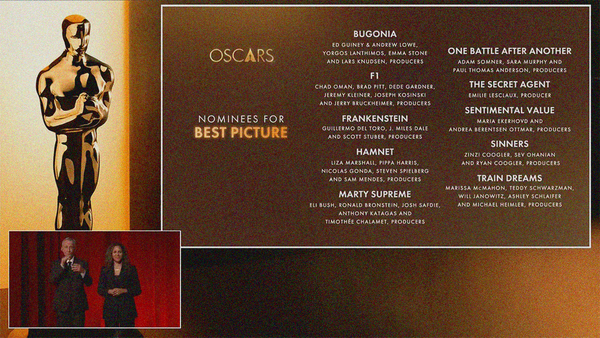Week Ending 8/8/25
Tre-Day Sundaes

This week saw the debut episode of HBO's "Hard Knocks: Training Camp with the Bills" and it truly does epitomize the team's ethos to simply be themselves.
The joke this entire off-season was that Sean McDermott and Brandon Beane kept the team a perennial Super Bowl contender to avoid ever having to do one of these shows. It worked because the producers' criteria for potential subjects had to be altered this year to finally force Buffalo into participating. So, rather than get those cameras and microphones into a chaotic situation poised for great melodrama, HBO headed to Rochester to show what a well-oiled, culturally sound machine looks like.
The wildest thing about that first episode was therefore the affected "narrator" voice Liev Schreiber adopted to take us from the classrooms to the field and beyond. Josh Allen signs autographs. Dion Dawkins shnows everyone his drifting skills. And Tre'Davious White makes Tre-Day Sundaes at Pittsford Farms Dairy & Bakery. The most dramatic storyline? Maxwell Hairston going down with a knee injury—a subject wrapped up in two minutes.
Is it good television? Well, people will surely enjoy seeing some of the off-field personalities with wives and kids providing a behind-the-curtain vantage, but Bills fans already know a lot of that because part of the team culture is letting these players show that personality on the field too.
So, this show may end up being more recruitment tool for free agents than easy fodder for controversy or distraction. Come to Buffalo for fun, camaraderie, adoring fans, and the chance to win. McDermott and Beane hope it'll only get more boring from here.

The A-Frame
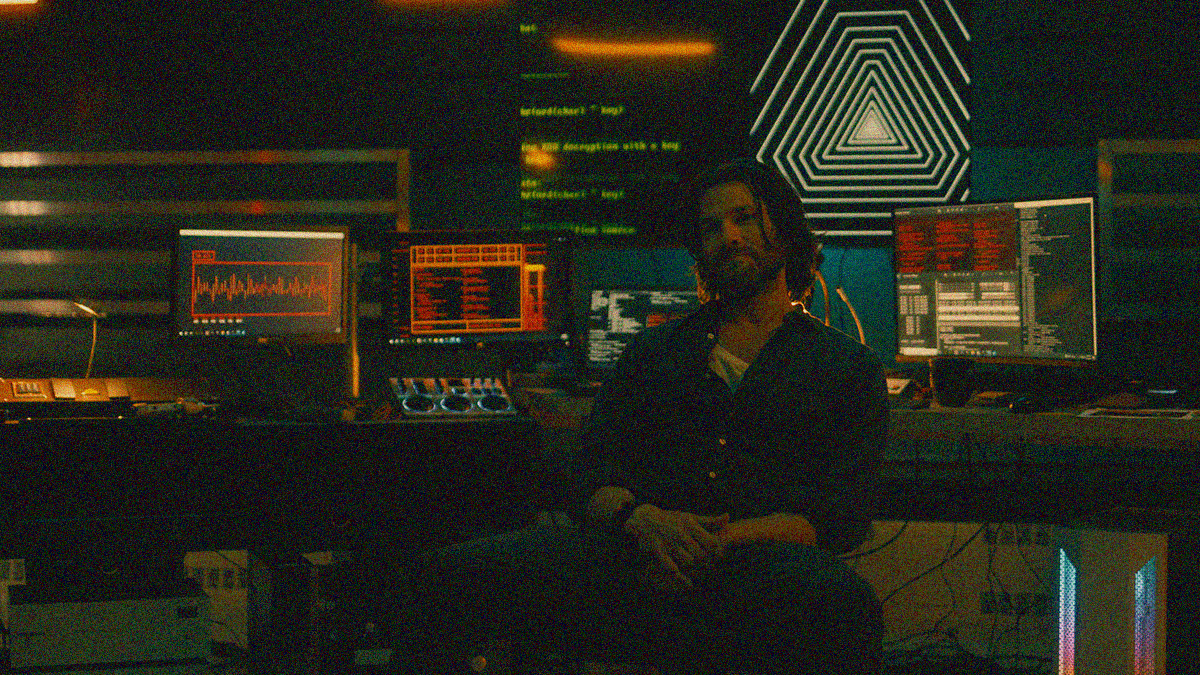
Sam (Johnny Whitworth) is a quantum physicist experimenting with the potential of interdimensional transportation via a device he calls The A-Frame. Through the course of his research and its application, he found the cheapest test subject at his disposal was cancer-ridden mice bred specifically for science. We don't know how many were sacrificed in pursuit of this endeavor—just that the ones who did make it through no longer had the disease. So, Sam found himself with the perfect pitch to recruit prospective human subjects: a cure for cancer.
It's an ingenious science fiction premise that places both its characters and the audience into a state of false security. Writer/director Calvin Lee Reeder supplies a miracle application with which to further dissect its unknowable process. Like a magic trick, we find ourselves focusing on questioning the validity of the former while forgetting there's zero proof of the latter. We take that part on faith because the rats came back and that faith is bolstered because Donna (Dana Namerode) receives a clean scan after volunteering to put her hand inside the machine.
What do we know about Sam, though? Yes, he's a charismatic loner who hacks into confidential clinic databases to stalk potential test subjects, but he's offering the impossible with full transparency as far as admitting even he doesn't yet know how. So, like Donna, we look past the creepiness. What's a bit of "strange" if the outcome is prolonged life? He's still operating in the shadows, though. And nothing he's doing is necessarily legal. He makes sure Donna knows to tell her doctors nothing about him if the experiment did work and he gains a built-in spokesperson for recruitment as a result.
He's an intriguing character because of how devoted he is to his science. The cancer angle truly is just a marketing ploy since he must prove the invention's viability under its original intent before ever pursuing its perceived health benefits. That means scaling up and documentation. The prototype was a self-contained unit serving as both entrance and exit. To prove the mice and Donna's hand actually traveled across the multiverse (while somehow leaving their cancer behind), demands sending a test subject between two units. Just like Mike Teavee.
That's where stage 5 cancer patients Rishi (Nik Dodani) and Linda (Laketa Caston) come in. It's also where Sam's creepiness factor begins to show signs of full-blown psychopathy. Donna is the key to both since she becomes the face of the process. She's not just a salesperson ... she's also a client. As such, the others place their trust in her. Not Sam. He gets to take a backseat and let her do all the heavy lifting because he knows what we refuse to admit: that maybe Donna was a fluke. That distance also insulates everyone from a core truth: entering Sam's office means relinquishing their humanity. They're merely supplies to him.
So, Sam and the A-Frame itself become intentionally ancillary to the whole. Because Reeder's film isn't about the science. It's about the journey Donna takes to accept her fate. Sam represents false hope via easy answers devoid of scrutiny. Linda, leader of a cancer support group, provides the counterpoint of advocating for an understanding of one's reality to realize it's always more constructive to think about the time you have rather than the time you want. She preaches living fully with the potential to endure. He's advocating risking everything for the potential to end up with less ... if anything at all.
That we learn this lesson via pretty gnarly genre gore is the cherry on top. Reeder flirts with cosmic horror as far as Sam not wanting "anything else coming back" beyond his atomized subjects, but the graphic results of attempts-gone-wrong are mostly nightmarish sci-fi uncertainty. That's fine because its less about that terror and more about how Donna reacts to it. Because Sam is unchanging (Whitworth's performance merely allows our perception of his eccentricity to change). Only Donna has the room to evolve through her experiences with him. Unfortunately, that evolution needs its fair share of tragic test subjects too.
6/10
Boys Go to Jupiter
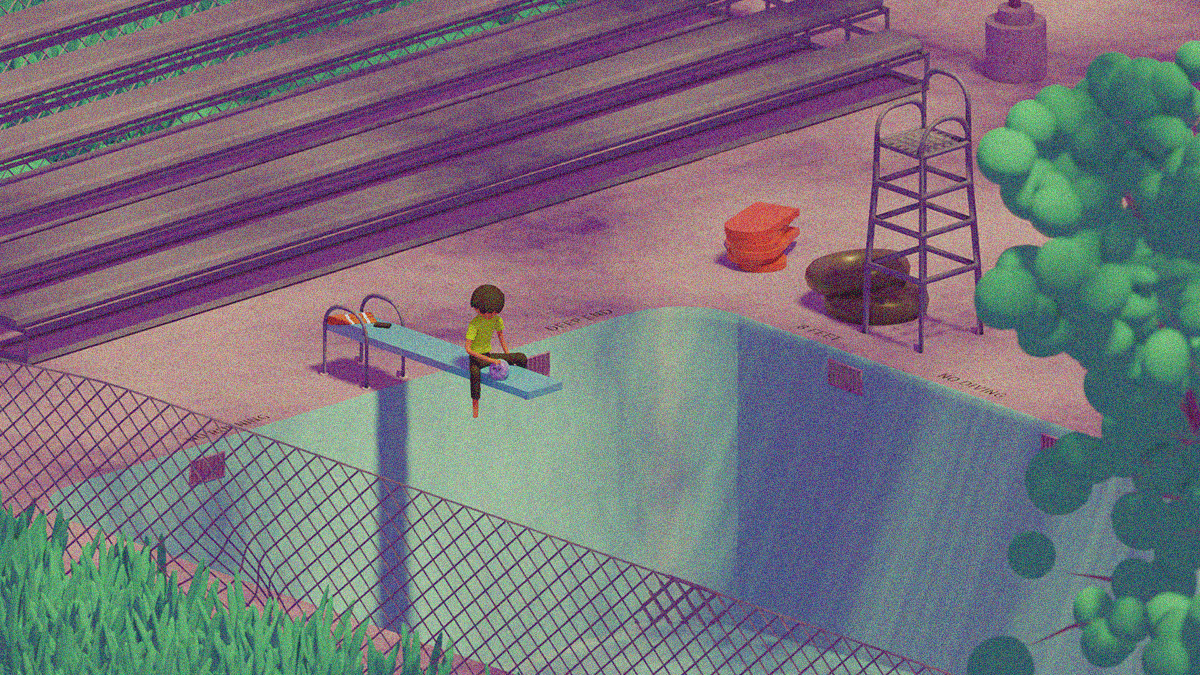
It's a week before New Year's and Billy 5000 (Jack Corbett) finds himself at a crossroads. Who cares that he's only a teen? A lot can happen in sixteen years. His mother has forgotten about him. He lives in his sister's garage. He's known by classmates as "The Human Calculator" and prone to getting so hyper-fixated on new topics that he'll sacrifice health and hygiene to become an expert. And he's recently dropped out of high school to follow the influencer buzzwords of Mr. Moolah (Demi Adejuyigbe) in pursuit of making a cool million.
Billy isn't delusional, though. He'll settle for five-grand right now to rent his own apartment and pay Gail (Eva Victor) back for her hospitality. And being the numbers man he is, a payment coding loophole in Grubster's delivery app supplies the potential of getting him there before the big ball drops on January 1st. So, despite his friends still loafing about and scamming strangers on the streets of Florida, Billy is all about the delivery hustle. Whether dinners to wrong addresses, spaghetti through mail slots, or pre-masticated hot dogs ... he's your guy.
The brainchild of illustrator Julian Glander, Boys Go to Jupiter bills itself as a surreal coming of age story animated (via Blender) in his trademarked bubbly style—one that gave me déjà vu to Untitled Goose Game. It's an apt description superficially, but don't read too far into Billy's finding a familiar trajectory to life lessons or major personal growth. At least not in the way you might think. We're dealing with alien-like creatures that call to mind Biblical doomsday scripture and mythologized dolphin-people, after all. Billy's yearning might be relatable, but the absurdity of his specific situation is unhinged.
That's the Sunshine State for you, though. And Glander admits many of his set-pieces were inspired by his own exploits doing odd jobs for odd neighbors in the Tampa area. The characters Billy interacts with are a cross between Florida Man idiocy and "Twin Peaks" strangeness (an unsurprising fact if you're familiar with the filmmaker's "Jeopardy!" appearance). There's the Old Slippy (Cole Escola) thinking the golf balls on her property are chicken eggs. Lonely hot dog vender Weenie (Chris Fleming) tooting his own product's horn. And mini-golf heir Herschel Cretaceous (Joe Pera) complimenting strangers to fish for reciprocation.
Some characters are plausibly figments of others' imagination (like Julio Torres' Brontosaurus who, along with Torres' Gas Station Guy, speaks in untranslated Spanish) while others contrast Billy's plight (like Grace Kuhlenschmidt's Freckles, Elsie Fisher's Beatbox, and J.R. Phillips' Peanut still acting their age despite losing their friend to the capitalist machine), but the main figures of note are an unlikely ally in Donut (a "theoretical circle creature") and unlikely villain in juice titan Dr. Dolphin (Janeane Garofalo). How they connect is crucial to the one real theme Billy does face: integrity.
Add a worm-like creature named Glarba (Tavi Gevinson) with an insane, late-stage re-contextualization and reluctant Dr.-Dolphin-Jr. named Rozebud (Miya Folick) and you truly have zero clue where Glander will take you next. It might be to another satirical take on the post-capitalist grind, a fantastical musical interlude (yes, it's a musical too) where Billy flies through the sky, or a disgustingly juvenile hazing ritual. Perhaps it'll be a fetishistic customer requesting way too much for the money being offered, an experimental fruit that needs a common fruit to serve as its host, or a sing-along critique of Florida cuisine.
It's easy to therefore forget these skit-like detours are tethered to a story until Billy stumbles back to it. Donut is more than just a bizarre pet. Insane rumors about Dr. Dolphin's origins might not be so insane once Glander normalizes exactly how insane he's made this world. And despite one obvious road for Billy to find maturity and fulfillment being inevitably born out of love, you'd be hard-pressed to find someone who isn't surprised about who provides the romance. That unpredictability is the real draw. Boys Go to Jupiter is a legitimately singular vision a la early Don Hertzfeldt that embraces its wave of unbridled chaos.
7/10
Cloud
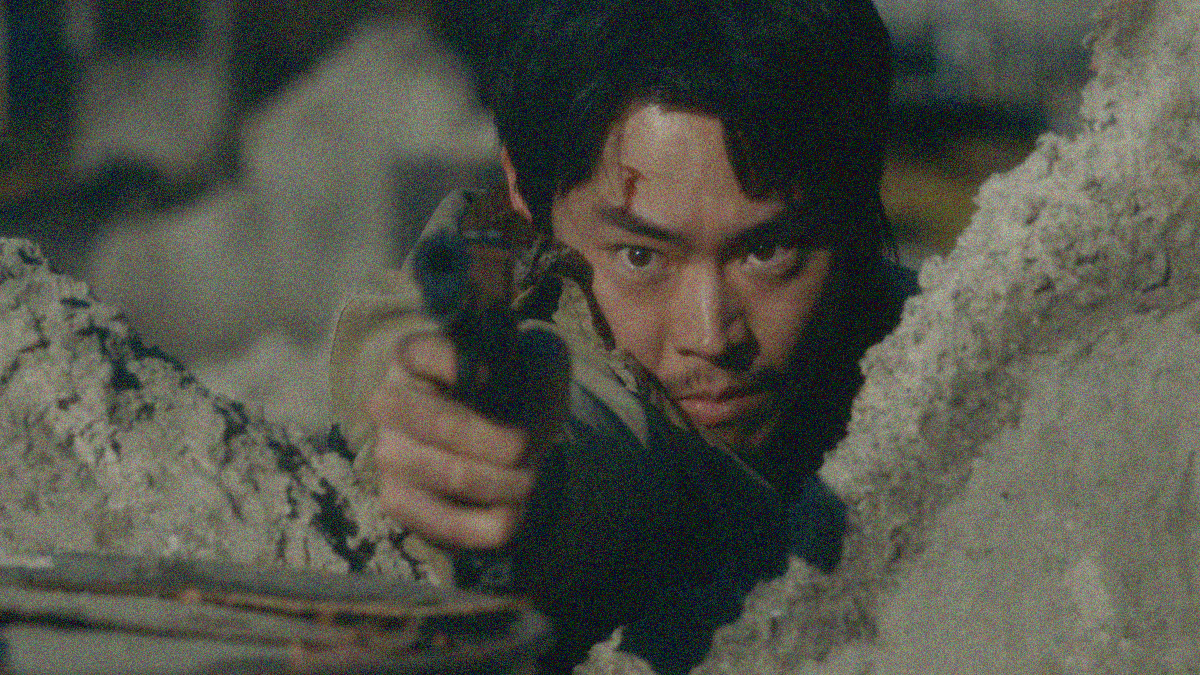
We meet Ryôsuke Yoshii (Masaki Suda) after he earns a tidy sum extorting a stranger's desperation. It's the sort of deal that exists in a moral gray area due to the fact he technically did nothing wrong. Someone needed to offload product to presumably pay down debt and Yoshii leveraged that situation into low-balling him via a take-it-or-leave-it ultimatum only to then resell the stock at an almost 700% profit. Shady? Yes. But the seller could have done the same if he knew how. A lot of people would actually call it a shrewd move on Yoshii's part, but that won't also absolve him of being a scumbag for executing the plan.
Writer/director Kiyoshi Kurosawa does well to ensure we realize this is Yoshii's first big score. Between showing him staring at the computer screen in hopes the merchandise sells out to his need to go to the bank to prove he didn't dream it all, this is a man emboldened overnight by the taste of success. And if he did it once, he can do it again. Right? So, why not quit his factory job despite the owner pleading to put him on the fast track towards one day taking it over from him? Why not tell his girlfriend (Kotone Furukawa's Akiko) to quit hers too with the promise she'll be able to satisfy all her materialistic fantasies?
Cloud progresses rapidly as a result—both to move things towards its dramatic escalation and to get us wondering whether Yoshii is going too fast. His life becomes a paranoia feedback loop wherein he assumes his reselling compatriot (Masataka Kubota's Muraoka) is phishing for details about his success and that Tokyo has become too unsafe to continue operating anonymously on the edge of legality. So, he moves to the sticks. Enlists a local kid (Daiken Okudaira's Sano) he assumes is too eager for work to overstep any trust boundaries. And switches his business plan from opportunistic purchases to potentially bogus wares.
But the paranoia only increases since everyone knows what he does. They don't know his username, but all online resellers have a reputation of being con artists willing to do anything for a quick score regardless of collateral damage. Yoshii does nothing to dispel that thought either as he grows more isolated and cagier as the days pass. Because he knows they're correct. He justifies his actions to himself, but that doesn't mean he's dumb enough to not fear retribution. It's why he can't help thinking a late-night "prank" of a smashed window isn't just a kid begrudging an outsider moving to town. It must be a warning of something worse. Yet he can't rely on the police since they'd love to make a house call and arrest him.
Rather than simply let Yoshii drive himself insane from the stress of replicating that initial success (pushing Akiko away, questioning Sano's loyalty, shipping from Tokyo in case local drivers snitch to the cops, etc.), Kurosawa dials things up further to introduce an online cabal of everyone Yoshii has screwed over either by fleecing them, conning them, or simply slighting them in wholly unrelated ways. These people are frothing at the mouth for someone to dox him so they can violently take a pound of flesh as penance. It's mob mentality at its finest because they've radicalized themselves to be clear-eyed and dead set in their mission. Reclaiming their warped notion of dignity means Yoshii must die.
The film is therefore pushing the toxicity of the internet to its extreme so that the rantings and ravings of people letting off steam and finding kindred souls to lament their shared victimhood can spill over into the real world. It's very effective too since Yoshii is such a normal, in-over-his-head character (expertly played with equal parts entitlement and fear by Suda) that we would never think he'd stumble into being hunted for sport. This is a guy whose ego will get him arrested or in hot water with the Yakuza because he dipped his toe in waters too deep. Inspire a hit squad of other ordinary people willing to risk their own lives for the chance to kill him, though? It's crazy.
Yet that's where we are as a society. I don't know the nuances in Japan where this stuff is concerned, but almost every tragedy that occurs in America today has some origin in online chatrooms and social channels stoking terror and rage to the point where someone ultimately snaps. It's tribalistic politicization against the opposite side of the aisle leading to assassinations. It's "men's rights" groups spewing misogyny and condoning domestic violence. It's white supremacists dragging their xenophobic ideals of replacement theory into full-fledged designs for genocide. The only thing necessary to bring such like-minded hate together is a common enemy. And Yoshii is exactly that for these men.
It culminates in a wild third act that Kurosawa fearlessly builds upon with new revelations to show there's no talking these men down or chance of them getting cold feet in the moment. More than that, though, he always seems to have a narrative maneuver up his sleeve to bring Yoshii into the fight too. Because that is a guy who'd soil himself once things get out of hand. He really believes he's just doing what anyone else would ... just quicker and smarter. To throw him in this scenario and ask him to save himself, though? Does Yoshii have it in him? And, if he does, will pulling the trigger make it that much easier to pull it again? It's just like with that initial windfall: You only need to sell your soul once.
8/10
The Occupant
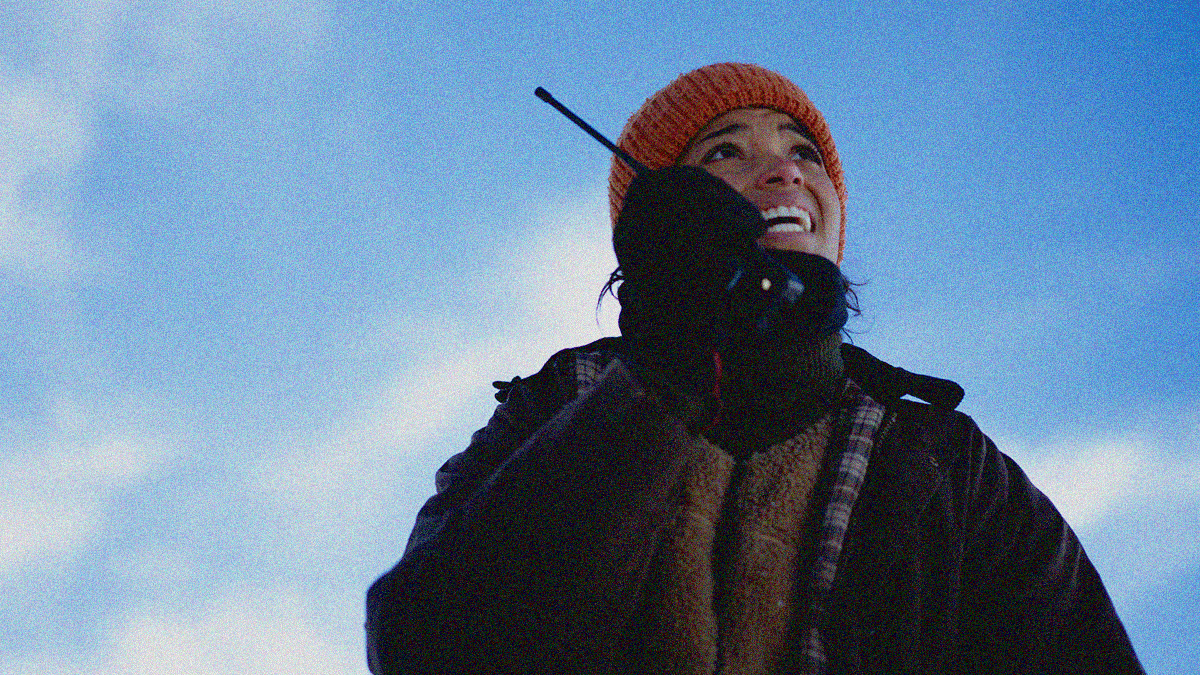
Beth (Vanessa Ifediora) is more than just a sister to Abby (Ella Balinska). She's her best friend. So, when the prospect of losing her to illness arises—in much the same way as they lost their mother—Abby cannot cope. She wants the best doctors. The most cutting-edge treatments. The fantasy that if you simply try hard enough and hope long enough, everything will be okay. It's why she ignores Beth's wishes to spend what little time she has left together and decides to go off to the Caucasus Mountains in Georgia to hunt for uranium deposits and raise enough capital to afford one more "miracle" that's probably just another dead end.
Director Hugo Keijzer (and his co-writers Philip Michael Howe, Roelof Jan Minneboo, and Xiao Tang) do a very good job presenting Abby as a hero at the start of The Occupant. Here she is sacrificing everything she has to save her sister no matter how crazy the task or how far she's traveled. It sets up their father (Stuart Graham's Archie) as a pessimist in the sense that he'd rather ensure his eldest daughter is comfortable in death than suffering in hope. So, when Abby still can't find what she's looking for and Archie still can't stand seeing Beth's pain, the former plans a return to stop him from giving up too early.
It's through the gradual reveal of memories that we rightfully realize this sense of heroism is built by Abby as a coping mechanism to avoid facing reality. Because there's a point when hope becomes destructive by sowing seeds of regret without you fully comprehending that you're already too late to stop it. We see it when Archie asks her to reconsider her journey and when Beth tells her she can justify her actions any way she wants so long as she doesn't lie by saying she's doing it for Beth rather than herself. I love a line where Abby yells that she's "doing everything she can to get back" since she never should have left in the first place.
That "everything" is where the film's survival aspect enters the fray. Right when it seems Abby found something to leverage into a windfall (albeit not uranium), Archie calls to say time is up. So, she stows this obsidian-like chunk of rock into her backpack, boards a helicopter, and plans her next excuse for why Beth should hang on. Unfortunately, a swarm of birds flying much higher than they should comes into their path and cuts through the engine. Suddenly Abby finds herself alone in sub-zero temps with days of hiking separating her from rescue. That's when a voice is heard over a shortwave walkie-talkie and she discovers her rock isn't quite as inert as she believed.
The point at which John (Rob Delaney) is introduced occurs just after we begin to worry about Abby's sanity. Not only is it unlikely that someone finally hears her transmission for help, but it's a wild coincidence he happens to speak English and even wilder still that he also survived a crash. Does that mean he's a manifestation of Abby's gradual psychosis? Maybe. What if it means this place is ruled by a supernatural force that simply takes down anyone who dares to cross into it? We're talking Russian occupied territory, after all. Geography that's so hush-hush and dangerous that Abby's pilot wouldn't even veer over to see his ancestral home.
It's in that space of uncertainty that we start learning why Abby has really come here. By talking to John over the radio, the cracks in her steely façade begin to show. Yes, she hopes to earn the money that can pay for a last-ditch treatment to save Beth's life, but she also just plain ran away to do so. This whole adventure is therefore driven by fear. She was too afraid to confront the prospect of losing Beth then to fulfill her wishes to live instead of merely survive. And now she's too afraid to risk missing the chance to say goodbye that she'll risk her own life to take the more arduous route to John than the smoother one to civilization.
We know it's a mistake regardless of whether John is on the up-and-up and that feeling only increases once the rock seemingly comes to life to assist choices that pull her further into the wilderness. It's as though it has sentience on top of a newfound malleability perfectly attuned to Abby's current needs. So, we must ask ourselves the obvious questions: Where is it really leading her? Has it already claimed John? Did Abby even survive the crash? And while we ask ourselves those queries, she finally looks within to consider the reasons she's about to die before Beth. What was her true endgame beyond a delusional fantasy that never would have justified the sacrifice necessary to see it through?
The Occupant inevitably goes to some strange and sufficiently dark places to satisfactorily explain the rock in Abby's possession, but it never strays from the underlying truth of her accepting her sister's fate. The whole becomes a showcase for Balinska as it's practically a one-woman show even when other characters are on-screen considering Abby's sole mission is to selfishly create the future Abby wants. Everyone else is a steppingstone to that destination—including Beth. It's why the choice Abby must make at the end is such a difficult one. She can either achieve a fabricated version of that perfect future or appreciate what's left of her tragic yet very real present.
6/10
Sudan, Remember Us

The title isn't a mistake. Sudan, Remember Us speaks to the fact that most of the revolutionaries Hind Meddeb captures throughout the four years unfolding on-screen no longer live in their country. They're amongst the 12.7 million Sudanese who have been displaced to Egypt and beyond while another estimated 150,000 were killed. These are the citizens declaring there will be no surrender who eventually realized the conflict had too many external forces assisting the military regime and not enough global journalistic exposure to combat it. So, they chose to live to fight another day and hope their homeland doesn't forget their sacrifice.
Meddeb ensures it by putting them on film. A French-Moroccan with Tunisian roots, she went to Sudan a month after the people's peaceful protests helped guide the Sudanese Armed Forces to overthrow President Omar al-Bashir. There was hope in the air as Lt. Gen. Ahmed Awad Ibn Auf took control of the government to steward a transfer of power to civilian leaders. Before that could happen, however, Auf resigned over protests against him for not extraditing al-Bashir to the International Criminal Court. Despite his successor being a direct ally to the people's movement during the coup, Lt. Gen. Abdel Fattah Abdelrahman Burhan had other ideas about Sudan's future.
With her own footage and videos shot by protestors and soldiers (the latter documenting their own brutality during the Eid massacre two months later), the film goes from jubilant optimism to abject despair. Focused solely on the revolutionaries' plight, we see their reactions to events that would ultimately replace an Islamist regime with a military one that restarted all al-Bashir's oppressive systems with even more violence and secrecy than before. Meddeb's subjects talk about hope and progress only to end up back in the streets for more civil disobedience. Sudan's youth become radicalized by the promise of freedom and the government sells its soul to the bidding wars of nations desperate to secure control over the nation's resources.
The film is therefore a document of a time and place that no longer exists. A portrait of a generation willing to give their lives for the promise of freedom who realized their blood wasn't enough if no one was paying attention. Platforming their voices alongside the words of the Sudanese poets and rappers who inspire them means that Meddeb doesn't provide much expositional context beyond a few words to set-up each new phase of the revolution. Her goal is to instead humanize the conflict, reveal the prevalent philosophical mindset, and show the sheer number of protestors to fully understand the will of the people is not being heard.
Now it's on audiences to do the research, identify the players, and ensure what's happening in Sudan remains transparent to prevent any rhetoric to the contrary from becoming uncontested historical truth. Sudan, Remember Us is powerful enough to propel that mission regardless of it being intrinsically incomplete for those ignorant to the ordeal. It grabs our attention with its emotion to win allies and advocates rather than a dense lecture that may alienate those who aren't already invested. And it also serves as a reminder to the exiles to not forget Sudan either. Maybe they won't be able to go back during their lifetimes, but immortalizing what they did might mean their children will.
7/10

This week saw Hercules (2014), Hot Rod (2007), Masterminds (2016), My Oxford Year (2025), and War of the Worlds (2025) added to the archive (cinematicfbombs.com).
Terri Anne Taylor dropping a fan-favorite f-bomb in Hot Rod.

Opening Buffalo-area theaters 8/8/25 -
• Andaaz 2 at Regal Elmwood
• Athadu at Regal Elmwood
• It's Never Over, Jeff Buckley at Regal Quaker
• Freakier Friday at Dipson Flix, Capitol; AMC Maple Ridge, Market Arcade; Regal Elmwood, Transit, Galleria, Quaker
• My Mother's Wedding at North Park Theatre (select times); Dipson Capitol; Regal Transit, Quaker
"Sometimes personal stories like this just don't quite translate to formulaic mainstream-appeal storytelling. Craft and intent simply couldn't quite push it across the finish line." – Full thoughts at The Film Stage.
• Repo Man (4K) at North Park Theatre (select times)
• Sketch at Dipson Capitol; Regal Elmwood, Transit, Galleria, Quaker
"This adventure through the emotions of grief is very much in that vein [of 80s/90s family fare] both in its imaginatively dark fantasy world-building and its heartfelt empathy between unlikely companions banding together to achieve a common goal." – Full thoughts at HHYS.
— Caveat on Sketch: Apparently Angel Studios (who inexplicably bought the rights to this very charming film that they did not produce) have created a tie-in app that turns kids' drawings into AI-generated monsters to mimic what occurs on-screen (which is conversely artisanal CGI—or was when I saw it at TIFF) and utilize the end credits to advertise it. I love the movie. I don't, however, love helping Angel Studios make money.
• Strange Harvest at Regal Transit, Galleria, Quaker
"Remove the cosmic aspects and you do feel like you’re on this bloody ride of murder as captured by [cameras]. It's just impossible to do so when the film leans into its “Lovecraftian” appeal so hard that the marketing push uses it as a selling point." – Full thoughts at HHYS.
• Su from So at Regal Elmwood
• Weapons at Dipson Amherst, Flix, Capitol; AMC Maple Ridge, Market Arcade; Regal Elmwood, Transit, Galleria, Quaker
Streaming from 8/8/25 -
• Clown in A Cornfield (Shudder) - 8/8
"[There's] a disingenuous undercurrent of older allies playacting today's youth's authentic rage. I'm sure Craig and Blanchard mean well, but this property needed filmmakers in their twenties or thirties behind the wheel rather than fifties and above." – Full thoughts at HHYS.
• Freaky Tales (HBO Max) - 8/8
"Oakland’s own Too $hort [narrates] the “facts” while also sprinkling in what he’s “heard” to cut through the speculation and breathe life into Fleck and Boden’s wildly violent homage to an era and area close to their hearts." – Full thoughts at HHYS.
• Harvest (MUBI) - 8/8
• Stolen: Heist of the Century (Netflix) - 8/8
• Fixed (Netflix) - 8/13
• Songs From the Hole (Netflix) - 8/13
• Mononoke The Movie: Chapter II - The Ashes of Rage (Netflix) - 8/14
Now on VOD/Digital HD -
• Abraham's Boys: A Dracula Story (8/5)
• The Accountant 2 (8/5)
• The A-Frame (8/5)
Thoughts are above.
• Caught by the Tides (8/5)
• CODA (8/5)
"What sets CODA apart from similar dramas is the central evolution not proving Ruby's alone. This is uncharted territory for them all." – Full thoughts at jaredmobarak.com.
• It's All Gonna Break (8/5)
• Jurassic World: Rebirth (8/5)
• The Wake (8/5)
• Animale (8/8)
• Birthrite (8/8)
• Ebony & Ivory (8/8)
• Hostile Takeover (8/8)
• The Occupant (8/8)
Thoughts are above.
• Shaman (8/8)

Pieces from the In the Company of Men (1997) press kit.
